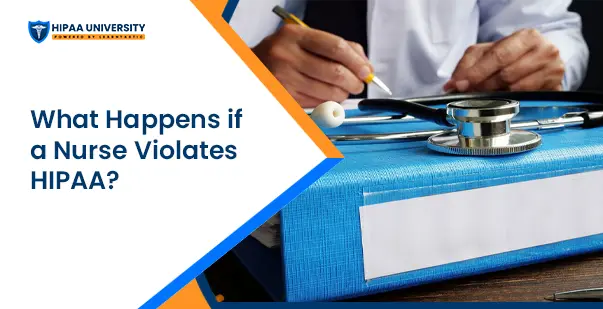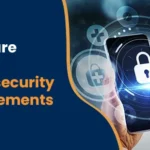What Happens if a Nurse Violates HIPAA?

September 6, 2024
Table Of Content
- Introduction
- What are the penalties if a nurse violates HIPAA?
- Real-Life examples of HIPAA violations by nurses
- The dangers of nurses violating HIPAA on social media
- How can nurses avoid HIPAA violations?
- Why HIPAA compliance is crucial for curses
- The role of training in preventing HIPAA violations
- The importance of reporting HIPAA violations
- Conclusion
Imagine you’re a nurse, dedicated to caring for patients, day in and day out. Your job is demanding, but it’s also rewarding because of the difference you can make. But what if you mistakenly share a patient’s information with someone who shouldn’t have access to it? Or worse, what if a careless mistake leads to a breach of privacy? This is where HIPAA, the Health Insurance Portability and Accountability Act, comes in.
HIPAA ensures that their personal health information is kept safe and secure. But what happens when this trust is broken? The consequences can be severe, even for the nurses involved. Violating HIPAA can lead to legal action. In this blog, we’ll explore the impact of a HIPAA violation for nurses. Understanding these consequences is crucial for every nurse. So keep reading to know what happens if a nurse violates HIPAA.
What are the penalties if a nurse violates HIPAA?
When it comes to protecting patient privacy, take HIPAA violations seriously. If a nurse violates HIPAA, it can be dangerous. They may face strict actions from their employer, such as a warning or even a suspension.
But that’s just the beginning. Nurses who violate HIPAA could also face legal consequences, including fines. These fines can range from $100 to $50,000 per violation, with a maximum penalty of $1.5 million per year. If the violation is found to be intentional or involves fraud, a nurse could even face jail time.
Read more: What Are the Consequences of a HIPAA Violation?
Real-Life Examples of HIPAA Violations by Nurses
Here are a few examples of HIPAA violations by nurses:
- Unauthorized Access to Medical Records: One of the most common nurse HIPAA violation cases involves nurses accessing patient records without a legitimate reason. For instance, a nurse might look up a friend’s or family member’s medical information out of curiosity. While it might seem harmless, this is a clear breach of HIPAA. In one case, a nurse was fired for repeatedly accessing her ex-boyfriend’s medical records without consent. This kind of violation not only breaches trust but also puts the nurse’s career at serious risk.
- Sharing Patient Information Without Consent: Another common mistake is sharing patient information without proper authorization. This might happen in casual conversations with colleagues or even in public settings. For example, a nurse might discuss a patient’s condition with another nurse in a hospital hallway where others could overhear. Even though the intention isn’t malicious, it’s still a violation. In some cases, nurses have been disciplined or even sued for sharing such information without permission.
- Inappropriate Use of Social Media: Nurses might be tempted to post about their workday or share interesting cases. For example, once a nurse posted a photo of a patient’s medical chart on social media, thinking it was harmless as no names were visible. This led to her termination because it was still a breach of patient confidentiality.
The Dangers of Nurses Violating HIPAA on Social Media
Social media is where all of our world revolves, although it is a risky place. If a nurse violates HIPAA on social media, they may not realize they are doing something wrong until it’s too late. Even if the intent isn’t harmful, the consequences can be severe.
For example, a nurse might share something online unintentionally. It is still possible to perform a violation even if there are no names mentioned. Moreover, if this goes viral, you cannot take it back. This might lead to job loss.
Another issue is the use of private messaging apps to discuss patients. Nurses might feel safe sharing details in what they think is a private conversation. But they are screenshots; they can cause violations. Hence, nurses must be aware of the repercussions of social media and think twice before posting anything related to a patient’s privacy.
How can nurses avoid HIPAA violations?
Avoiding HIPAA violations also involves understanding patient privacy. Here are a few tips nurses can follow to avoid HIPAA violations:
- Think Before You Act: Always consider whether your actions could lead to a breach of patient privacy. If you’re unsure, it’s better to err on the side of caution.
- Limit Access: Only access patient records when it’s necessary for your job. Curiosity is never a good reason to look up someone’s medical information.
- Be Careful with Conversations: When discussing patient information, do so in private settings where others can’t overhear. Never share patient details in public places.
- Be Smart on Social Media: Keep work and social media separate. Avoid posting anything related to your job, especially if it involves patient information. Even vague posts can lead to unintended violations.
Read more: Most Common HIPAA Violations You Should Avoid
Why HIPAA Compliance is Crucial for Nurses?
HIPAA compliance ensures patient privacy. Here are some additional reasons why HIPAA compliance is crucial for nurses:
- Protecting Patient Privacy Nurses can easily access sensitive patient information, and HIPAA compliance ensures that this information stays secure. By following HIPAA guidelines, nurses can protect patients’s rights. It is more than avoiding fines; it is about protecting personal details.
- Maintaining Professional Integrity Adhering to HIPAA rules shows how committed a nurse is. When they prioritize privacy, they value their patient’s well-being. This makes them confident as a healthcare team member.
- Avoiding legal and professional consequences Non-compliance can cause legal consequences, including fines and job loss. Nurses who understand and follow HIPAA regulations can avoid consequences. Compliance helps protect the nurse’s career and the organization from facing any legal trouble.
The role of training in preventing HIPAA violations
Training is vital in helping nurses prevent HIPAA violations by keeping them informed. It ensures that nurses understand the latest regulations and apply them in real life. Regular training makes nurses confident and reduces the chances of unintentional breaches. The role of training is as follows:
- Staying updated on regulations HIPAA regulations can change, so ongoing training is always a must. Training sessions help nurses stay updated with the latest developments. This way, you can prevent accidental violations.
- Learning practical scenarios Effective training includes real-life scenarios that nurses often encounter in daily life. Practice scenarios enable nurses to better protect the critical information.
- Understanding Digital Risks As the digital tools seem to rise, nurses must understand the risks associated. Training should cover ways to securely manage patient data on digital platforms to prevent breaches.
The importance of reporting HIPAA violations
Reporting HIPAA violations helps maintain trust and prevent breaches. Here is why reporting HIPAA violations is crucial:
- Preventing Further Breaches Reporting HIPAA violations, whether they are accidental or intentional, is important. When a nurse reports a potential violation, it allows the healthcare facility to take immediate action.
- Improving Facility Policies Reporting violations can improve healthcare facilities’s policies. When a breach is reported, it can be concerning. Nurses must report to address these gaps and increase safety.
- Empowering Nurses to Act Nurses should feel empowered to report any HIPAA concerns without any hesitation. When nurses understand the reasons they must report, this leads to a more secure culture at the workplace.
Conclusion
HIPAA violations are harmful for nurses’ careers and reputations. Hence, to avoid this, nurses must understand the importance of protecting patient privacy and follow HIPAA guidelines. Now that you know what happens if a nurse violates HIPAA, follow the right practices and stay vigilant to provide high-quality care to patients. Safeguarding their information is not just a requirement but a crucial part of being a responsible healthcare professional.





